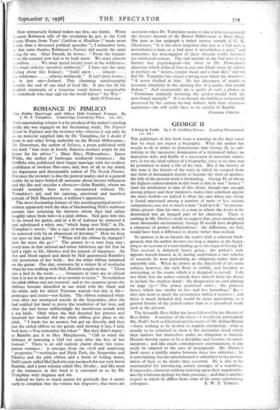GEORGE II THE publishers of this book issue a warning
on the dust cover that we must not expect a biography. What the author has sought to do is rather to demonstrate that George II, in sub- mitting to the successive domination of a tyrannical father, an imperious wife, and finally of a succession of autocratic minis- ters, is not the ideal subject of a biography, since at no time was he permitted to enjoy a life of his own. But if the history of this man is the history of the ways in which he escaped from one form of domination merely to become the slave of another, the title of the present work is misleading. George II, of whom the highest commendatiOn in this book is that he was " honest " (and the attribution to him of this virtue, though rare enough among princes and their ministers, makes him somehow appear the more foolish—as indeed is often the case when one virtue is found marooned among a number of more or less vicious companions), was not so much a man " held in tt 113 " by person- alities greater than his own, as a man in whom the desire to be dominated was an integral part of his character. There is nothing in Mr. Davies's study to suggest that; given another and more favourable environment, George II would have displayed a character of greater independence : the difference, we feel, would have been a difference in degree rather than in kind.
So anxious is he to furnish the reader with a coherent back- ground, that the author devotes too long a chapter at the begin- ning to an account of events leading up to the reign of George II. This account is definitely heavy going ; the author's style appears muscle-bound, as if, having undertaken a vast scheme of research, he were performing an obligatory rather than an enjoyable task. When he arrives at the threshold of his main subject, however, the style flows as swiftly, and becomes as interesting, as the events which it is designed to record. I do not think that the author entirely frees himself from his desire to include the smallest detail : the disquisition on card playing on page 73—" The prince preferred ombre ; the princess basset, which was similar to faro and less hazardous," &c.— does not seem to merit the prominence which it receives ; and there is much included that would be more appropriate to a general history of the period rather than to a specialised study such as the present.
The Scientific Best-Seller has been followed by the Historical Best-Seller. A number of the latter—I would cite particularly Mr. Neill's book on Elizabeth and the works of Mr. Arthur Bryant —leave nothing to be desired as regards scholarship : what is usually to be criticised in them is the decorative detail which their authors feel themselves under an obligation to furnish. History thereby ceases to be a discipline and becomes an enter- tainment ; and like much contemporary entertainment, it can easily be adapted to the uses of propaganda. Mr. Davies's book steers a middle course between these two extremes ; he is entertaining, but his entertainment is subsidiary to the presen- tation of facts as he thinks they occurred. He is also to be commended for introducing certain passages of a scurrilous, if expressive, character without insisting upon their unprintable- ness by a fulsome apology for their presence ; and that is another respect in which he differs from some of his more entertaining






































 Previous page
Previous page